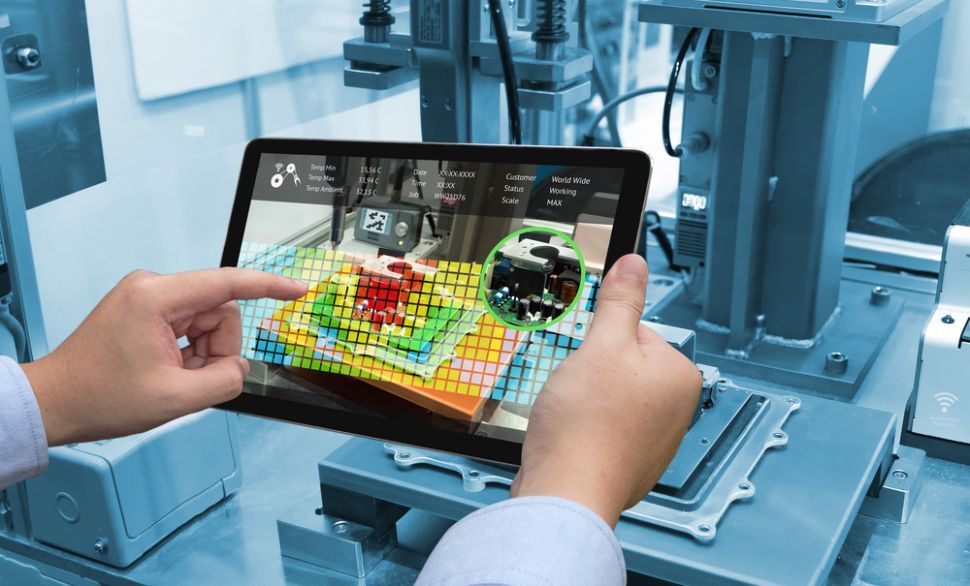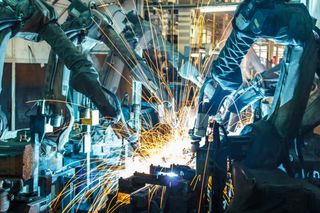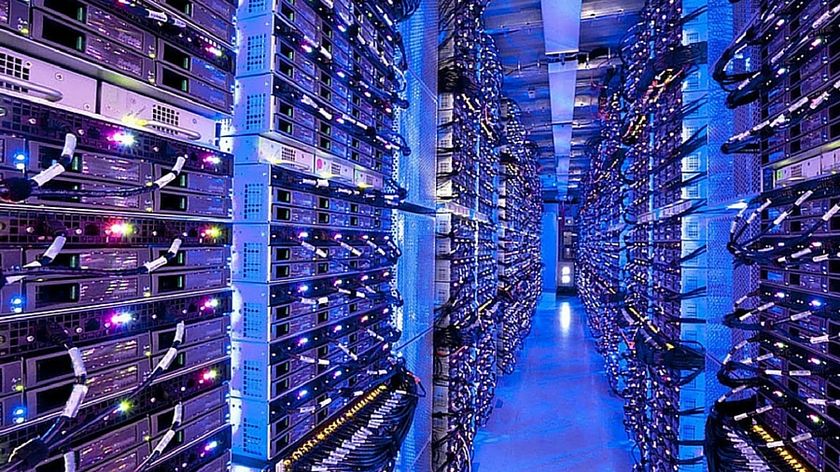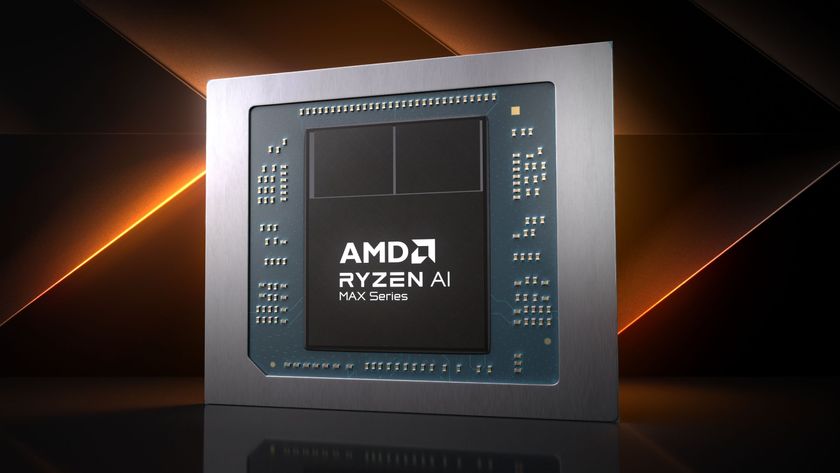What is Industry 4.0? Everything you need to know
All the latest news, views and developments in the exciting world of Industry 4.0

What is Industry 4.0?
There's no question that technology is playing a huge part in our everyday lives today, but the increasingly connected culture we live in is also having an impact on the world of industry.
Welcome to Industry 4.0, the name given to the growing combination of traditional manufacturing and industrial platforms and practices with the latest smart technology.
This primarily focuses on the use of large-scale M2M and Internet of Things (IoT) deployments to provide the likes of increased automation, improved communication and monitoring, as well as smart machines that can analyse and diagnose issues without the need for human intervention.
Industry 4.0 is already seeing factories become increasingly automated and self-monitoring as the machines within are given the ability to analyse and communicate with each other. This then free ups their human co-workers, granting companies much smoother processes that leave employees open for other tasks.


Industry 4.0 - the latest news
24/07 - Industry 4.0: for smarter operations - Understanding the real-world applications of IIoT data capture...
13/05 - Don’t forget the human touch in Industry 4.0 - Seamless customer experiences that balance technology with human touch...
04/04 - Industry 4.0 suffering major security issues - Manufacturing sector lags behind when it comes to cybersecurity...
Are you a pro? Subscribe to our newsletter
Sign up to the TechRadar Pro newsletter to get all the top news, opinion, features and guidance your business needs to succeed!
29/03 - Why mobile is at the heart of Industry 4.0 - Industry 4.0 or the IIoT will change every sector and mobile will play a huge role...
22/03 - IoT security spend to reach £1bn in 2018 - Gartner figures suggests increased awareness of threats is boosting spend...
10/03 - Forget smart fridges: the Industrial Internet of Things is the real revolution - Industry 4.0 is already here and making massive differences...
25/02 - Industry 4.0: an industrial evolution, rather than a revolution - The connected, intelligent factories of the future will usher in a new generation of industry...
20/02 - UK businesses unprepared for Industry 4.0 - Manufacturing industry in the UK has done little to adopt automation and other digital technologies...
30/10/2018 - 'Fourth Industrial Revolution' could unlock billions for the UK - Embracing Industry 4.0 technologies could be key to major new benefits, report claims..

Why Industry 4.0? What happened to Industry 2.0 and 3.0?
Industry 4.0 is neither a new form of technology, nor a business ideal, but in fact a revamped approach inspired by new advancements to achieve results that weren't possible 10 years ago.
It has also been labelled as "the fourth industrial revolution" - but what exactly does that mean?
The first industrial revolution saw Britain move from farming to factory production in the 19th Century. The second spanned the period from the 1850s to World War I and began with the introduction of steel, culminating in the early electrification of factories and the first spouts of mass production. Finally, the third industrial revolution refers to the change from analogue, mechanical, and electronic technology to digital technology that took place from the late 1950s to the late 1970s.
The fourth, then, is the move towards digitisation. Industry 4.0 uses the Internet of Things and cyber-physical systems such as sensors to collect vast amounts of data that can be used by manufacturers and producers to analyse and improve their work.
Recent advancements in big data and analytics platforms means that systems can trawl through the huge sets of data and produce insights that can be acted upon quickly.
Smart factories, which will be at the heart of Industry 4.0, will take on board information and communication technology for an evolution in the supply chain and production line that brings a much higher level of both automation and digitisation. It means machines using self-optimisation, self-configuration and even artificial intelligence to complete complex tasks in order to deliver vastly superior cost efficiencies and better quality goods or services.

Who started Industry 4.0?
Industry 4.0 is different in that it stems not from a single company, but instead from government, with a 2013 German government memo widely recognised as one of the first times that 'Industrie 4.0' was mentioned.
The high-tech strategy document outlined a plan to almost fully computerise the manufacturing industry without the need for human involvement. The idea really hit the headlines when Chanceller Angela Merkel spoke glowingly of the concept in January 2015 at the World Economic Forum in Davos, calling 'Industrie 4.0' the way to "deal quickly with the fusion of the online world and the world of industrial production."
To date, German government is investing some €200 million (around £146 million, $216 million, or AU$278 million) to encourage research across academia, business and government, and Germany isn't the only country where advancements are taking place.
The United States has the Smart Manufacturing Leadership Coalition (SMLC), a non-profit organisation made up of manufacturers, suppliers, technology firms, government agencies, universities and laboratories that all have the common goal of advancing the way of thinking behind Industry 4.0.
It is aiming to construct an open, smart manufacturing platform for industrial-networked information applications. The hope is that it will eventually enable manufacturing firms of all sizes to gain easy and affordable access to modelling and analytical technologies that can be customised to meet their needs.

How much is Industry 4.0 worth?
Anything attached to the Internet of Things or increased automation is worth a tidy sum and Industry 4.0 is no different, with analysis valuing the technology around the idea as practically never-ending.
Recent figures from KPMG has estimated that the component markets of Industry 4.0 are estimated to be worth more than US$4 trillion by 2020.
This is above the expected value of the Internet of Things (IoT) market, which Gartner has estimated will be worth almost US$3.7 trillion by 2020.
Businesses everywhere are thought to be able to benefit from embracing Industry 4.0, with a recent government report claiming that utilising this advanced technology could benefit the nation's manufacturing sector by around £445 billion and create around 175,000 jobs,
Much of this is down to the thirst for higher productivity and cost reductions from using real-time data. This can also be another area where technologies of the future, such as 5G, will have an effect and make sure the "things" are buzzing away at optimum efficiency.
Whatever the cost, the value of Industry 4.0 comes from improving productivity and removing inefficiency at all levels, making it one of the most valuable ideas of our time.

Mike Moore is Deputy Editor at TechRadar Pro. He has worked as a B2B and B2C tech journalist for nearly a decade, including at one of the UK's leading national newspapers and fellow Future title ITProPortal, and when he's not keeping track of all the latest enterprise and workplace trends, can most likely be found watching, following or taking part in some kind of sport.









